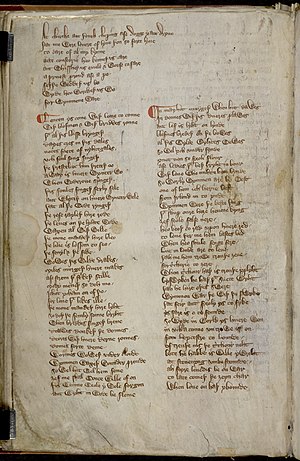"Lenten ys come with love to toune", also known as "Spring", is an anonymous late-13th or early-14th century Middle English lyric poem which describes the burgeoning of nature as spring arrives, and contrasts it with the sexual frustration of the poet. It forms part of the collection known as the Harley Lyrics. Possibly the most famous of the Middle English lyrics, it has been called one of the best lyrics in the language, and "a lover's description of spring, richer and more fragrant in detail than any other of its period." No original music for this poem survives, but it has been set to music by Benjamin Britten, Alan Rawsthorne and others. It was included in The Oxford Book of English Verse.




